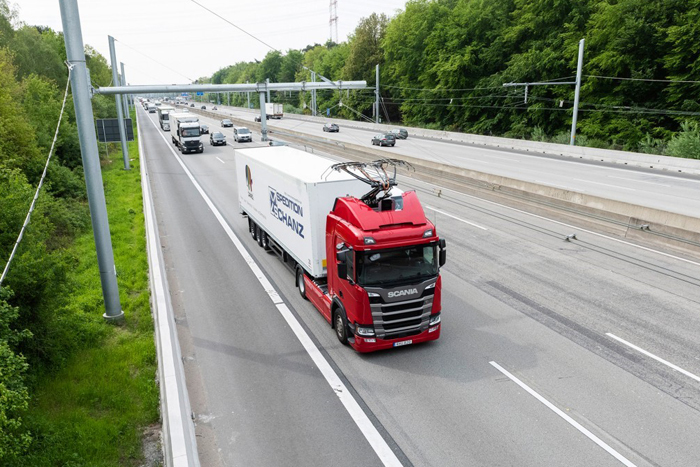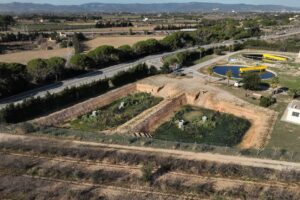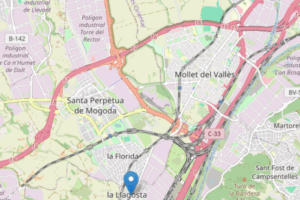
An app is developed based on intangible cultural heritage to prevent memory loss in elderly people
July 21, 2021
Cooperative robots developed to harvest dessert grapes
September 8, 2021The Centre for Technological Innovation in Static Converters and Drives (CITCEA) of the UPC participates in a project to investigate the planning of electric recharging infrastructure on motorways using overhead lines. The first results of the study have been published recently in the scientific journal Energies.
The total electrification of the transport sector is needed to combat the effects of climate change. However, while the introduction of electric vehicles for passenger transport is gradually increasing, heavy vehicles continue to be almost exclusively dependent on fossil fuels. Although lorries only represent 5% of the vehicles that circulate by road in the European Union, they are responsible for over 25% of total CO2 emissions, a fact that shows the need to progress in the decarbonisation of the sector.
To achieve this objective, it is vital to equip motorways with infrastructure that meets the future demand of electrical mobility, a challenge on which the Centre for Technological Innovation in Static Converters and Drives (CITCEA) of the Universitat Politècnica de Catalunya · BarcelonaTech (UPC) is working as part of the FuChar research project.

The initiative is focused on planning the electricity grid and the design of the charging infrastructure on motorways, for passenger vehicles and heavy vehicles, to minimise the costs associated with integrating electric transport into the network. In this respect, researchers are working to develop methods and tools to optimally integrate the charging infrastructure into the distribution network. For this purpose, patterns of transport, user behaviour and charging profiles of electric vehicles are analysed. In addition, alternative systems to improve the use and flexibility of the charging structure are investigated.
Overhead lines as recharging infrastructure
In the first phase of the study, scenarios of electrification using different charging technologies − inductive, overhead line and traditional charge points – were assessed using past data from a section of the E18 motorway in the south of Norway to predict charging in medium voltage substations. These simulations provide important data on the use of overhead lines as charging technology.
The next steps in the research are to add a cost-benefit analysis of the various solutions studied, considering future mobility scenarios in urban environments, with the introduction of autonomous vehicles, the shared use of vehicles and the increase in the number of passengers in public transport.
Fuchar is a four-year project that will be completed in 2022. It is funded by the Norwegian Research Council for Science under the leadership of the SINTEF research centre. The first results of the study have been published recently in the scientific journal 'Energies'.
Topic
You want to know more?
Related Projects
- A research team from the UPC, in collaboration with the company B. Braun Surgical, has created a ceramic and biocompatible catalyst that captures greenhouse gases and transforms them into useful chemical products in a more sustainable way and at a lower cost than current technologies. The technology has successfully passed the pilot phase through joint projects with companies from different sectors.
- The company Trace ID and the group Twin Investors, in collaboration with the Textile Technology research group (TECTEX), which is part of the Institute of Textile Research and Industrial Cooperation of Terrassa (INTEXTER) at the Universitat Politècnica de Catalunya - BarcelonaTech (UPC), are developing electronic devices to identify, monitor, and study the traceability of the products in which they are embedded.
- The Hydrogeology Group (GHS) at the Universitat Politècnica de Catalunya - BarcelonaTech (UPC) is participating in the LIFE REMAR project to develop an innovative and sustainable solution for the reuse of treated wastewater through infiltration, with the aim of increasing the availability of freshwater resources and improving the state of ecosystems.
- A team from the Environment Centre Laboratory (LCMA) of the Universitat Politècnica de Catalunya - BarcelonaTech (UPC) is taking part in a study commissioned by the city councils of la Llagosta, Mollet and Santa Perpètua (in Vallès Occidental), with the main objective of identifying the impact of industrial plants on the generation of unpleasant odours and continuously monitoring air quality in these municipalities.




